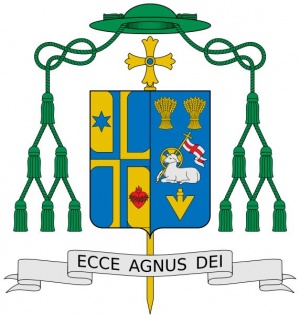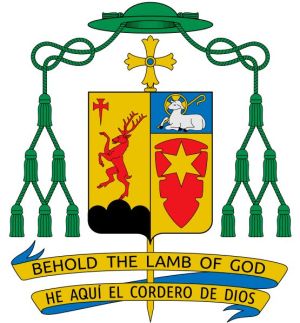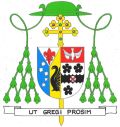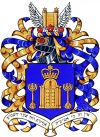Edward Joseph Weisenburger: Difference between revisions
Knorrepoes (talk | contribs) No edit summary |
Knorrepoes (talk | contribs) m (Text replacement - "↵{{media}}" to " {{rel}} {{media1}}") |
||
| Line 27: | Line 27: | ||
The achievement is completed with the heraldic insignia of a prelate of the rank of bishop by instruction of the Holy See, of March 1969, confirmed in March 2001. | The achievement is completed with the heraldic insignia of a prelate of the rank of bishop by instruction of the Holy See, of March 1969, confirmed in March 2001. | ||
{{ | {{rel}} | ||
{{media1}} | |||
[[Literature]] : https://www.diocesesetucson.org/office-of-bishop/Coat-of-Arms.html, 2017 | [[Literature]] : https://www.diocesesetucson.org/office-of-bishop/Coat-of-Arms.html, 2017 | ||
[[Category:Roman Catholic bishops|Weisenburger]] | [[Category:Roman Catholic bishops|Weisenburger]] | ||
Revision as of 12:17, 26 December 2022
Religious or Ecclesiastical heraldry portal
This page is part of the Ecclesiastical heraldry portal |
Heraldry of the World |
|
Catholic heraldry
|
Other Christian churches Other religions
|
EDWARD JOSEPH WEISENBURGER
Born : December 23, 1960
Deceased :
Bishop of Salina, 2012-2017
Bishop of Tucson, 2017-present
| Bishop of Salina |
Bishop of Tucson |
Official blazon
Origin/meaning
As common in US episcopal heraldry, the arms show the arms of the diocese impaled with the personal arms of the bishop.
The blue chief refers to the Blessed Virgin Mary under her titles of the Mother of God, Mother of the Redeemer, and Mater Ecclesiae. The Agnus Dei, or Lamb of God refers to the Blessed Lord and is so central to the Bishop's spirituality that he chose it for the main charge as well as his motto: Behold the Lamb of God (in English and Spanish in Tucson, in Latin in Salina).
The golden field in his Tucson represents the purity of the Triune God, Divinity and truth. Upon this gold field appears a large stone arrowhead, depicted here as those that may be found in archeological dig sites within the Tucson diocese' s borders. An arrowhead presented in the downward position is a heraldic sign of peace. Moreover, the arrowhead is worked in red, borrowing this color from the Tucson diocesan arms. Red also represents the blood of the pierced heart of Saint Augustine, an homage to the patron saint of Tucson's Cathedral. The arrowhead serves as a secondary homage to Oklahoma, the bishop's home state and home archdiocese. Upon the arrowhead sits the six-pointed star of the Blessed Virgin Mary in her title of Our Lady of Perpetual Help, a secondary homage to the Diocese of Salina, which honors the Blessed Mother as their patron saint under this particular title. In his arms in Salina, the arrowhead was a much smaller version.
The wheatsheaves in his Salina arms refer to the TSta eof Oklahoma and its large wheat fields.
The achievement is completed with the heraldic insignia of a prelate of the rank of bishop by instruction of the Holy See, of March 1969, confirmed in March 2001.
This page is part of the Ecclesiastical heraldry portal
|
Catholic heraldry
|
Other Christian churches |
|
Literature : https://www.diocesesetucson.org/office-of-bishop/Coat-of-Arms.html, 2017







